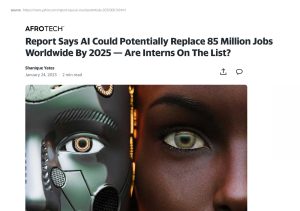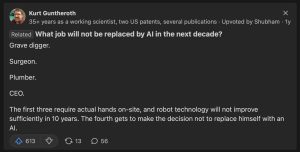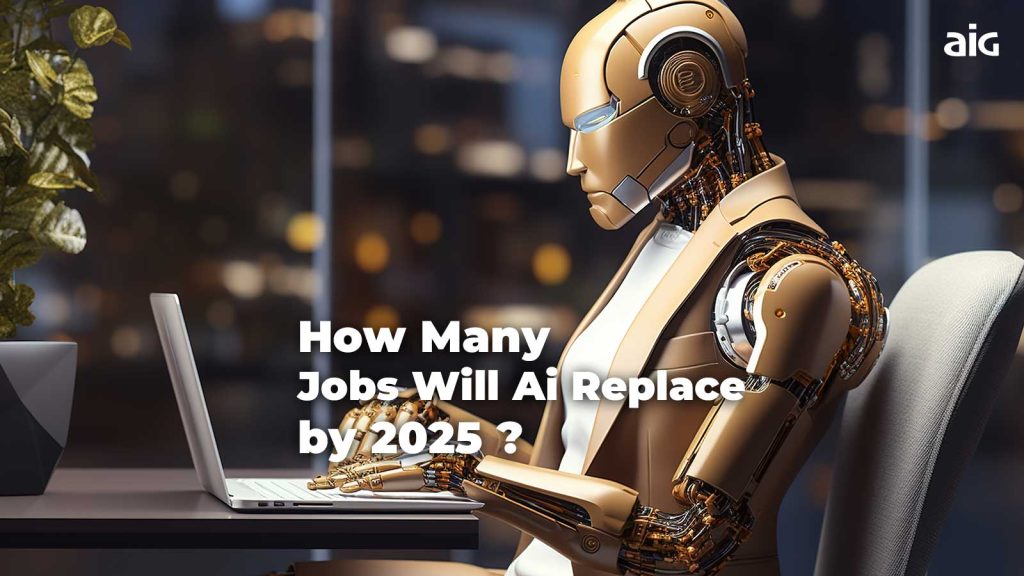One of the most important concerns that all humans have is that artificial intelligence will one day be able to make everyone unemployed and replace people in all jobs, but we don’t know which jobs will be eliminated. That’s why Aigeeks asks this question: How many jobs will ai replace by 2025?
In order to get to the right answer quickly, there are a few important things we need to understand first.
- Why can artificial intelligence easily replace today’s jobs?
- The impact of artificial intelligence in the world economy
- Jobs Eaten Away by AI Already
- Jobs that may be lost in the future.
- The Positive and Negative Effectiveness of Artificial Intelligence on Jobs
- Conclusion
Table of Contents
Why can artificial intelligence easily replace today’s jobs?
Jet lag appears to be the most common problem that crews experience when crossing time zones. Regularly traveling on long-haul routes means that pilots and crew members usually go through several different time zones during their duty periods.
This situation causes irregular sleep times, jet lag, and disorientation, which can adversely affect the performance of pilots and crew members. AI is able to travel through massive amounts of data, discover patterns and come up with findings that eyes of humans may overlook or unravel with time.
The AI can be also utilized to eliminate the tasks which are of routine, repetitive and reliant on standardization. this is a possible solution for the request that does not necessarily depend so much on creativity, sound decision-making, or socialization.A factor constituting an easy task of AI systems taking over the day’s duties is that AI improves from data and feedback without requiring the implementation of explicit programming or supervision.
and here we have yahoo site opinion.
The impact of artificial intelligence in the world economy
and if you want to understand more be sure to read another article about ai Consciousness
The impact of AI on the global economy is anticipate transforming significantly and the level of changing be complicated and effect so many. The World Economic Forum indicates that AI is going to provide 97 million new jobs to people by the year 2025 and its productivity can displace 85 million existing ones.
Therefore, AI will alter the mode of jobs together with the portion in which they are appropriate within companies and their geographic position; these new conditions will establish chances and threats for workers and for companies.
Industry sectors likely to reap the greatest gain from AI are the automobile and aviation industry, research, design, and management consultancies, information and technology services as well as electronic trade companies.
Their industries will become AI-driven in the future and will, to a certain extent, need AI talents i.e. data scientists, machine learning engineers, software developers etc. These roles emphasize the need for proficient technical professionals who are working with critical thinking and problem-solving approaches.
The companies that will be affected negatively the most are firms from such spheres as the oil and gas sector, real estate sector, the media and entertainment areas, and the production of consumer goods.
Jobs Eaten Away by AI Already
AI has to a great extent automated those jobs that humans were also involved in either partially or wholly. Here are some examples of jobs that AI has already taken over: Here are some examples of jobs that AI has already taken over:

Report Says AI Could Potentially Replace 85 Million Jobs Worldwide By 2025
- Journalists: AI can create new stories, abstracts and subtitles based on the facts and keywords from the available data. In the same way, the Associated Press has put AI in financial reports as well as sport news writing through a system called Wordsmith.
- Lawyers: AI, while reading through the legal arts, of contracts, documents and cases can proffer such as the advice, recommendations and predictions. For instance, COIN is a JP Morgan’s AI system that does the extraction of informational after analyzing a loan agreement.
- Doctors: To this end, AI assist doctors in different stages of diagnosis, treatment, and patient monitoring by using medical records, pictures, and sensors among others. For instance, IBM Watson Health employs a technology in cancer, radiology, and genomics called Watson to help the doctors.
- Teachers: AI can educate students, mark assignments and give assessments, including making use of data curriculum, algorithms, and others. Likewise, Coursera leverages an AI system called Cogito, which is adjusted for the students individually to customize their learning paths and recommend lessons.
we have very powerful video for understanding this article.
Jobs that may be lost in the future.
AI is not only taking the places of jobs that are already in the industry, but also developing positions that do not exist still.
While jobs are not all segregating into those that AI can replace and those that remain human, those positions are more vulnerable to the automation possibilities than others depending on the level of automation potential, skill requirement, and human value.
As per their study conducted by Oxford University, about 47% of US jobs contain a high level of the risks of being automated by 2033. Here are some examples of jobs that are at high risk of being replaced by AI.

What job will not be replaced by AI in the next decade?
Here are some examples of jobs that are at high risk of being replaced by AI:
- Accountants: Accountant is entrusted to bring in to being and and so does the validation of financial record to maintain the accuracy, check for compliance and taxes obligations. Apart from doing the human-like tasks such as accounting consultation and audit, AI does automate most of the tasks that accountants do- data entry, reconcile, audit and report, among the many approaches.
- Cashiers: Cashiers make sales, receive payments, issue receipts and render people services. While AI is capable of performing some of the cashier duties, it can be automated to the tasks that a cashier rarely does such us scanning items, processing transactions, and giving change.
- Drivers: The driving force of a vehicle and delivery of passengers or products are one of the most significant privileges it confers to its holder under the terms and regulations of traffic laws. While the human component can execute the majority of the driving tasks, such as steering, accelerating, braking, and navigating, automated vehicles can do that alternatively.
- Receptionists: One of the most important duties of a receptionist is to have a warm welcome for external visitors, taking incoming calls, and giving information. However, AI can take over the roles of receptionists by accomplishing all the tasks they carry out such as detecting faces, voices, and emotions addressing issues and arranging appointments.
and here we have very good video for you.
The Positive and Negative Effectiveness of Artificial Intelligence on Jobs
AI is going to affect job on positive as well as negative sides that will depend on what scenario, perspective, and results we are seeing at. Here are some of the possible effects of AI on jobs: Here are some of the possible effects of AI on jobs:
- Positive Effects:
- AI will bring with it new roles that use human skills, which are imagination, creative problem-solving, interaction among human beings and teamwork, among others. These jobs will be more meaningful, appealing, and better paid while companies will benefit from extensive value creation, competent and attractive jobs.
- AI development will supplement the positions that demand human or interpersonal skills, among them empathy, originality, judgment, and decency. These occupations will not only be more productive, but also efficient, and effective for workers, and on the contrary.
- AI will make a better life not only for employees but also for a worker where there will be less stress, fatigue, boredom, and errors, thus workforce will be more adaptable to new working environment and realize greater autonomy, learning, and development.
- negative effects:
- Human skills of manual, physical and social types are replaced here by AI which will put to the cut some jobs. Among these roles, the job may be more inaccessible to workers, hard to maintain due to job losses, and unstable because there is no guarantee that jobs will last.
- This will result in different types of jobs being automated, the loss of jobs by the people who have lack the skills, education or experience to adapt to the changing job market. These employees are therefore exposed to unemployment, underemployment, or low paying jobs.
- AI will amplify the inequality and insecurity of work and income that is experienced by individuals who do not provide AI with the skills, education, and knowledge, and those who do Inequality is another side of AI which can raise and hold back economies.
- AI brought along the entitled issues that may lead to an accordance with privacy, security, accountability, and bias, which the workers, employers and customers entitled too many rights, responsibilities and values.
Conclusion
AI is an innovative and enhancing factor, that by 2025 will rebuild the workplace. AI will result in the creation of new jobs, the cycling of existing jobs into more challenging ones, and the eventual provision of better-quality work and life for workers and customers alike.
AI will make some jobs extinct, some workers would be displaced and have separate work and income, therefore there is a possibility of increasing the unequal and polarized work for most people.
AI is expected to bring ethics, law, and social issues that will affect the workers’ rights, responsibilities, and alleged values opposite the employers, employees, and customers.



![Ai Game Company [ Games + companies based on artificial intelligence ]](https://aigeeks.net/wp-content/uploads/2024/03/Ai-Game-Company--300x169.jpg)


